What Is L-Arabinose?
Chemical Structure and Natural Sources
Understanding l-arabinose and its potential side effects begins with knowing its fundamental nature. L-arabinose is a naturally occurring monosaccharide, or simple sugar, that has gained attention in the health and wellness community for its unique properties. Unlike common table sugar (sucrose), l-arabinose sugar functions differently in your body. It’s found naturally in various plant sources, including corn, apple, and wheat bran. What makes this compound particularly interesting is its potential role in sugar metabolism and its applications in health supplements.
The structure of l-arabinose allows it to interact with digestive enzymes in a way that may influence how your body processes other sugars. While l-arabinose side effects are generally mild, it’s important to understand how its structure contributes to both its benefits and potential drawbacks.
Relationship with Other Sugars
When you consume l-arabinose along with regular sugar, it can temporarily bind to certain digestive enzymes. This interaction is what makes it potentially valuable for health-conscious individuals, though it’s essential to be aware of potential l-arabinose side effects before incorporating it into your routine.

The Science Behind L-Arabinose
Understanding the L-Arabinose Operon
The l-arabinose operon system has been extensively studied in molecular biology. While this might sound technical, it’s essentially the genetic mechanism that controls how organisms process l-arabinose. This natural biological system demonstrates how deeply integrated this sugar is in fundamental cellular processes, which helps explain why l-arabinose side effects can vary among individuals.
How L-Arabinose Sugar Functions in the Body
When you consume l-arabinose, it works primarily in your digestive system. Its interaction with digestive enzymes can influence how your body processes other sugars, particularly sucrose. Understanding these interactions is crucial for minimizing potential l-arabinose side effects while maximizing its benefits.
Benefits of L-Arabinose
Blood Sugar Management
One of the most studied benefits of l-arabinose is its potential role in blood sugar management. Research suggests that when taken with meals containing sugar, it may help moderate the post-meal blood sugar response. However, it’s important to monitor for any l-arabinose side effects while using it for this purpose.
Weight Management Benefits
The potential blood sugar moderating effects of l-arabinose have led to interest in its role in weight management. By potentially influencing how your body processes sugar, it might support your overall weight management goals when used as part of a balanced diet and healthy lifestyle.
Other Potential Health Benefits
Beyond its primary effects on sugar metabolism, researchers are investigating other potential benefits of l-arabinose. These include its possible prebiotic properties and its role in gut health. However, it’s crucial to note that many of these potential benefits are still under investigation, and more research is needed to confirm these effects while ensuring the safety and understanding of l-arabinose side effects.
Common L-Arabinose Side Effects
Mild Side Effects
When beginning supplementation with l-arabinose, some individuals may experience mild digestive adjustments. Common l-arabinose side effects in this category can include temporary bloating or mild gastrointestinal discomfort. These effects typically subside as your body adapts to the supplement. However, if you notice persistent mild l-arabinose side effects, consider adjusting your dosage.
Moderate Side Effects
Some users report experiencing moderate l-arabinose side effects, particularly when taken in higher doses. These may include temporary changes in bowel movements or minor stomach cramping. While these l-arabinose side effects are generally not severe, they should be monitored carefully.
Severe Side Effects
Although rare, more significant l-arabinose side effects can occur in sensitive individuals or those with underlying health conditions. If you experience any severe reactions, discontinue use immediately and consult your healthcare provider. Understanding potential l-arabinose side effects is crucial for safe supplementation.
Who Should Take L-Arabinose?
Target Demographics
L-arabinose sugar supplements may be particularly beneficial for individuals interested in:
- Managing their sugar intake
- Supporting healthy blood sugar levels
- Maintaining a balanced metabolism However, individual responses can vary, and some may be more susceptible to side effects than others.
Contraindications
Certain groups should exercise caution or avoid l-arabinose due to limited research or potential risks:
- Pregnant or nursing women
- Individuals with severe digestive disorders
- Those with diabetes should consult their healthcare provider first
- People with known enzyme deficiencies
Risk Groups
Some populations may need extra monitoring when using l-arabinose:
- Elderly individuals
- Those with compromised immune systems
- People with a history of digestive sensitivities
- Individuals taking multiple medications
Dosage and Timing
Recommended Dosage Guidelines
The optimal dosage of l-arabinose varies based on individual factors and intended use. Starting with a lower dose allows you to assess your tolerance and minimize potential side effects. The l-arabinose operon research has helped establish general dosage ranges, but individual responses may vary.
Best Time to Take L-Arabinose
Timing your l-arabinose intake can significantly impact its effectiveness:
- Take it 15-30 minutes before meals containing sugar
- Space doses throughout the day if taking multiple servings
- Consider your meal timing and daily routine
- Monitor your body’s response to different timing schedules
Duration of Use
When using l-arabinose supplements:
- Start with a short trial period (2-4 weeks)
- Monitor your response and any potential side effects
- Adjust usage based on your personal goals and tolerance
- Consider cycling on and off to assess continued benefits
L-Arabinose in Different Products
Dietary Supplements
L-arabinose is available in various supplement forms:
- Powder supplements for flexible dosing
- Capsules for convenience
- Combination products with other sugar-managing ingredients Quality and purity can vary significantly between products, so choosing reputable manufacturers is essential.
Safety and Quality Considerations
Manufacturing Standards
When selecting l-arabinose supplements, understanding manufacturing standards is crucial for your safety and the product’s effectiveness. High-quality l-arabinose products should be manufactured in facilities that follow Good Manufacturing Practices (GMP) and undergo regular quality testing. The presence of potential l-arabinose side effects makes it particularly important to choose products from reputable manufacturers who maintain strict quality control measures.
Product Selection Tips
The quality of l-arabinose sugar supplements can significantly impact both their effectiveness and safety profile. When evaluating different products, look for transparent labeling that clearly states the concentration of l-arabinose and any additional ingredients. Given that l-arabinose side effects can vary based on product quality, it’s essential to research manufacturers’ reputations and look for third-party testing certifications.
Drug Interactions and Precautions
Known Drug Interactions
Understanding potential interactions between l-arabinose and medications is crucial for your safety. The l-arabinose operon system’s influence on sugar metabolism suggests possible interactions with diabetes medications. If you’re taking any medications, particularly those affecting blood sugar levels, consulting with your healthcare provider about potential l-arabinose side effects and interactions is essential before starting supplementation.
Special Precautions
Special consideration should be given to certain health conditions when using l-arabinose supplements. Those with digestive disorders or metabolic conditions should exercise particular caution and monitor for l-arabinose side effects more closely. Additionally, if you’re planning any surgical procedures, it’s recommended to discontinue use at least two weeks before surgery, as the effects of l-arabinose on blood sugar levels could potentially interfere with surgical protocols.

Research and Clinical Studies
Current Scientific Evidence
The scientific community continues to investigate l-arabinose and its potential applications. Recent studies have focused on understanding how l-arabinose side effects manifest in different populations and under various conditions. While many studies show promising results regarding sugar metabolism, researchers are also examining long-term safety profiles and optimal dosing strategies.
Ongoing Research
Current research is expanding our understanding of l-arabinose sugar and its mechanisms of action. Scientists are particularly interested in studying the relationship between the l-arabinose operon and its effects on human metabolism. These ongoing studies are crucial for establishing more precise guidelines for safe use and better understanding potential side effects in diverse populations.
Market Availability and Forms
Popular Forms
L-arabinose is available in several forms to suit different preferences and needs. The powder form offers flexibility in dosing and can be easily mixed with beverages or food. Capsules provide convenience and precise dosing, which can be particularly helpful when managing potential l-arabinose side effects. Some manufacturers also offer specialized blends that combine l-arabinose with complementary ingredients for enhanced benefits.
Market Trends
The market for l-arabinose supplements continues to evolve as consumer awareness grows. With increasing interest in natural sugar management solutions, manufacturers are developing more sophisticated formulations. However, this growing market also emphasizes the importance of understanding both the benefits and potential drawbacks of different product forms, particularly regarding their safety profiles and effectiveness.
FAQs About L-Arabinose
Common Questions
Q: What makes l-arabinose different from regular sugar?
A: Unlike regular sugar, l-arabinose functions primarily as a sugar metabolism modifier. While both are naturally occurring compounds, l-arabinose side effects and benefits stem from its unique ability to influence how your body processes other sugars, rather than serving as a direct energy source.
Q: How quickly does l-arabinose work in the body?
A: The l-arabinose sugar begins working shortly after consumption, typically within 15-30 minutes. However, individual responses vary, and some people may experience different timing of both effects and potential l-arabinose side effects.
Q: Can I take l-arabinose daily?
A: While daily use is common, it’s important to monitor your body’s response. Understanding potential l-arabinose side effects and starting with a lower dose can help you determine if daily use is appropriate for your needs.
Safety Concerns
Q: Is l-arabinose safe for diabetics?
A: While the l-arabinose operon system suggests potential benefits for blood sugar management, diabetics should consult their healthcare providers before use. The interaction between l-arabinose and diabetes medications requires careful monitoring.
Q: Are there any long-term risks associated with l-arabinose use?
A: Current research on long-term use is still ongoing. While short-term l-arabinose side effects are generally well-documented, it’s advisable to periodically assess your continued use and any changes in your response to the supplement.
Usage Questions
Q: What’s the best way to incorporate l-arabinose into my diet?
A: For optimal results, consider taking l-arabinose shortly before meals containing sugar. The timing and dosage can affect both its effectiveness and the likelihood of experiencing side effects.
Conclusion
L-arabinose represents an interesting development in the field of natural sugar management supplements. Through our comprehensive examination of its properties, benefits, and l-arabinose side effects, we can see that it offers unique potential for those interested in managing their sugar metabolism naturally. The interaction between l-arabinose sugar and your body’s digestive processes provides a novel approach to supporting healthy blood sugar levels.
However, it’s crucial to approach supplementation with informed caution. While many users report positive experiences, individual responses can vary significantly. The presence of the l-arabinose operon and its role in sugar metabolism suggests both opportunities and considerations for different users. When considering l-arabinose supplementation, remember these key points:
- Start with lower doses to assess your individual response
- Monitor any potential side effects carefully
- Maintain open communication with your healthcare provider
- Consider your personal health goals and conditions
- Choose high-quality products from reputable manufacturers
- Stay informed about ongoing research and developments
By taking a balanced approach and staying aware of potential l-arabinose side effects, you can make an informed decision about whether this supplement aligns with your health goals. Remember that while l-arabinose shows promise in supporting sugar metabolism, it works best as part of a comprehensive approach to health that includes proper diet, regular exercise, and overall healthy lifestyle choices.



